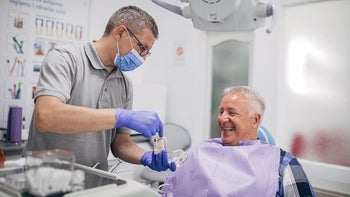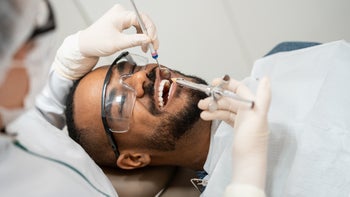
The Best (and Worst) Foods to Eat After Wisdom Teeth Removal
Key takeaways:
After wisdom tooth extraction, drink lots of water and eat soft foods that you can easily tolerate, such as yogurt and applesauce.
Avoid alcohol, hot beverages, and carbonated drinks after surgery, since they may irritate tooth sockets.
Hard, crunchy, scalding-hot, or spicy foods can cause pain and bleeding and may prolong the healing process.
Many people find it painful when wisdom teeth grow in, and it’s common for them to be impacted. That means they’re trapped in your jaw or under your gums and aren’t growing in the right position.
Most people have at least one impacted wisdom tooth. And this can create problems. For example, the tooth could be painful or infected. Even more, it can cause cysts, gum disease, or decay. In these cases, your dentist will likely recommend surgery to remove the wisdom tooth.
After surgery, there may be some swelling and mild discomfort. In fact, pain and trismus (difficulty opening the mouth) occur in about 7 out of every 10 people after wisdom tooth surgery. These issues can affect chewing, swallowing, and food intake.
Search and compare options
It’s common to have to modify your diet after having your wisdom teeth removed. That means adding foods that aren’t painful to chew. Let’s review the best foods to eat after wisdom tooth removal and which ones you should avoid.
What foods should you eat after wisdom teeth removal?
After wisdom tooth extraction, your oral surgeon will likely tell you to drink lots of water and eat soft foods that you can easily tolerate. You’ll want to make sure to get enough protein, vitamins, and minerals. That’s because these nutrients are helpful for wound healing. Malnutrition is a problem in wound healing. And falling short on protein and vitamins will slow the healing process.
Choosing the correct foods to eat immediately after wisdom tooth surgery is also important for preventing a “dry socket”. A dry socket is a complication that occurs when a blood clot comes out of the socket after a tooth extraction. This can happen from doing some things too soon after surgery, such as:
Rinsing
Spitting
Smoking
Using a straw
Hard foods and bacteria buildup are also contributing factors. In some cases, the bacteria left in the socket can prevent you from forming a new blood clot. And this will delay healing in the area and cause you to have more pain.
What to eat the day of surgery
Soft foods that you can include in your diet immediately after wisdom tooth removal include:
Applesauce or other pureed fruits (try baby food)
Warm (not hot) broth or cream soups
Smoothies (no straw)
Cottage cheese
Milk
Pudding or jelly
Yogurt
Hummus
Protein shakes (no straw)
Resuming your workouts: If you’ve just had a tooth extraction, how long should you wait before exercising to avoid complications?
How much pain to expect: Three people weigh in on how much it hurts to have your wisdom teeth removed and the best way to handle the pain.
A smoother recovery: Experts say it takes about 2 weeks to recover from having your wisdom teeth removed. Here are some tips to help you make it through more easily.
Try to also include a source of protein with your meals. Protein helps speed wound healing. Ideas for proteins include:
Boneless fish filets
Cooked lentils, beans, or chickpeas
Tofu
Scrambled eggs
Greek yogurt
What foods and drinks should you avoid after wisdom teeth removal?
It’s important to keep in mind that certain foods can irritate the surgery spots in your mouth and slow down the healing process. The following should be avoided until proper healing occurs:
Spicy foods
Acidic foods and beverages
Steaming hot foods and beverages like coffee and tea
Hard, crunchy, and crumbly foods (like chips, popcorn, cookies)
Grains, seeds, and nuts that could get lodged in the wound
Chewy foods (like candy)
Carbonated beverages like soda or seltzers
Alcohol
How long after wisdom teeth removal can I eat?
It’s best to wait until your anesthesia completely wears before eating. However, if you’re hungry before that happens, eat something that doesn’t require a lot of chewing. It may feel like you have trouble swallowing. Or it can be difficult to coordinate your lower jaw for eating and drinking immediately after surgery. You might even find yourself drooling a bit until the anesthesia wears off.
The amount of numbness that you still feel from anesthesia will be a factor in what you feel comfortable eating. So you’ll also want to be careful with your food choices. Chewing foods while you’re numb can also cause you to bite your tongue, cheeks, or lips. Liquids or soft foods that don’t require much chewing are best until you regain feeling in and around your mouth.
When can you reintroduce solid foods?
You can expect to eat solid food 3 to 4 days after your surgery. Let pain be your guide though. It can take up to 2 weeks to recover from wisdom tooth extraction. But you won’t have to eat soft foods for that long. Usually, the soft diet just lasts for a few days or until you can comfortably chew again. Eat what feels good, and go back to eating regular food when you feel less pain.
Frequently asked questions
It’s best to avoid drinking soda and other carbonated beverages for 2 to 3 days after wisdom teeth removal. The bubbles and fizziness found in sodas can cause you to lose the blood clot that’s forming and can lead to a dry socket. Also, the sugars and acidity from these beverages can lead to gum irritation. All of these factors can delay wound healing.
Dry socket becomes less of a risk after the first 2 to 3 days. Typically, a stable blood clot has formed by this time, if post-operative care instructions have been followed. However, it can take 7 to 10 days to be completely safe from developing a dry socket.
After wisdom tooth surgery, there are some habits you want to avoid for at least 72 hours. This will prevent disrupting the blood clot at the surgical site as well as bleeding, pain, and a dry socket. Avoid the following:
Using straws
Rinsing and spitting
Smoking
The bottom line
It’s important to follow your post-operative care instructions after wisdom tooth removal. Also, be prepared by stocking your fridge and pantry with enough soft and semi-soft foods to last a few days. Wisdom tooth removal foods you can try include yogurt, applesauce, potatoes, and your favorite ingredients for smoothies. You’ll want to also focus on getting enough protein to help with wound healing.
If you’re having a hard time with your diet after having your wisdom teeth removed, let your oral surgeon know. They can give you guidance on how to ensure you get the proper nutrition while you’re healing.
Why trust our experts?



References
American Association of Oral and Maxillofacial Surgeons. (2019). What are impacted wisdom teeth?
InformedHealth.org. (2023). Should you have your wisdom teeth removed? Institute for Quality and Efficiency in Health Care.
Mamoun J. (2018). Dry socket etiology, diagnosis, and clinical treatment techniques. Journal of the Korean Association of Oral and Maxillofacial Surgeons.
Mouth Healthy. (n.d.). Wisdom teeth. American Dental Association.
National Health Service. (2024). Wisdom tooth removal.
Politis, C., et al. (2016). Wound healing problems in the mouth. Frontiers in Physiology.
Russell, L. (2001). The importance of patients’ nutritional status in wound healing. British Journal of Nursing.
Suragimath, G., et al. (2010). Effect of carbonated drink on excisional palatal wound healing: A study on Wistar rats. Indian Journal of Dental Research.
Taniguchi, S., et al. (2022). Factors associated with a reduced food intake after third molar extraction among adults: A cross-sectional study. BMC Oral Health.

























